Diesel Fuel Market
The world of the energy market is a business for professionals.
Diesel Fuel (EN590)
EN590 is a standard that specifies the requirements for diesel fuel in the European Union. It sets limits on various properties of diesel fuel, including its sulfur content, density, flash point, and cetane number. Diesel fuel that meets the EN590 standard is commonly used in diesel engines in Europe and other parts of the world. The maximum sulfur content allowed in EN590 diesel fuel is 10 parts per million (ppm), which is much lower than the sulfur content in older diesel fuels. This is important because sulfur can contribute to air pollution and can damage the engines and exhaust

PRICE & MARK PLATE
The price of EN590 diesel fuel in global markets is influenced by a range of factors, including:
- Crude oil prices – Diesel fuel is derived from crude oil, so changes in crude oil prices can have a significant impact on the price of EN590 diesel fuel.
- Refining costs – The cost of refining crude oil into diesel fuel, including transportation, labor, and other expenses, can affect the price of EN590 diesel fuel.
- Supply and demand – Changes in global demand for diesel fuel, particularly from the transportation sector, can affect the price of EN590 diesel fuel. Similarly, changes in the supply of diesel fuel due to refinery maintenance or unplanned outages can also impact prices.
- Government regulations – Government regulations, such as taxes, subsidies, and environmental standards, can affect the price of EN590 diesel fuel in different markets.
- Currency exchange rates – The price of EN590 diesel fuel is often denominated in US dollars, so changes in currency exchange rates can affect the price of the fuel in different countries.
Overall, the price of EN590 diesel fuel in global markets can be highly volatile due to these and other factors, and can vary significantly across different regions and countries.

A safe business has managed risk
so that the chance of winning and guaranteed profit
is not lost
Identification utility tools
Tank Storage Tracking tool
Due to the sale of products based on the conditions of delivery in tank farm storage tanks, buyers after receiving fuel product identity documents such as TSR or DTA, using online solutions to identify the actual tanks and product inventory in them on the international online site. And confirmed, you can reduce the risk of not being sure about the availability of the product in the tank.
Tank Terminals
Global Petroleum Storage Data
https://www.tankterminals.com
Vessel tracking tool
By utilizing online tools available on reputable international websites, you can track ships and access information about their vessels. This modern approach allows you to accurately determine the location and verify the authenticity of energy cargo documents by entering the IMO or other relevant ship data. Here are the top organizations and websites that are related to this topic.
Marin Traffic Organization
https://www.marinetraffic.com/
Vessel Finder
https://www.vesselfinder.com/
Ports & Routs Database
You can use this site for information and to find specialized data such as the capabilities of each port, the distance between the ports, the sea routes between the origin and the destination with the desired speed setting (simulation of shipping operations), etc.
Ports & Marin Routs Website
WWW.PORSTS.COM

Fuel transportation capacities
The capacity of ships carrying diesel fuel can vary widely depending on the size and type of the vessel. However, some common types of tankers used to transport diesel fuel include Panamax tankers, Aframax tankers, and Suezmax tankers. These tankers can have capacities ranging from around 70,000 to 200,000 deadweight tons (DWT)
The International Maritime Organization (IMO) is a specialized agency of the United Nations responsible for regulating international shipping. It was established in 1948 and is headquartered in London, United Kingdom.
IMO Ship Numbering FAQ
Download PDF


Mandatory Standard Shipping Documents Index :
- Cargo Manifest
- Certificate of Origin
- Certificate of Quality and Quantity
- Customs Declaration
- International Maritime Dangerous Goods (IMDG) Code
- Inspection Certificate (by International Organization)
- Material Safety Data Sheet (MSDS)
- Tank Ship Time Sheet
- Tanker Bill of Lading
- Ullage report
- Master’s Receipt for documents
- Master’s Receipt for Sample
GDG Delivery Procedure & Proccess
Last Update : 2023 November 18
CIF (Normal)
(ID: PPCIF181123-HAB)
- The Buyer issues ICPO must be with the buyer’s company letterhead.
- The seller issue Commercial Invoice (CI)
- The buyer open MT799 pre-advise to seller account with attached TSA (Optional Document)
- Seller issues Draft Contract (SPA) to the Buyer and The Buyer Signs, Seals and returns the Seller for finalalize and endorsement.
- The Seller gives Partial proof of products (pPOP).
- The Seller Issue The All Custom and Export License (Completed Documents) :
(a) Seller Irrevocable Commitment to Supply
(b) Statement of availability of product.
(c) Certificate of origin
(d) Commercial invoice for the first value shipment.
(e) Product Passport. - Within 5 (Five) banking days, Buyer’s bank sends Irrevocable, transferable, divisible, Operative SBLC via MT760 according to seller’s fiduciary bank verbiage to seller nominated fiduciary offshore bank account for first month shipment, should buyer fail to issue payment instrument within 5 banking days, buyer will make cash deposit of $320,000 USD by TT wire transfer for security guarantee to enable seller charter vessel and commence shipment, and this payment will be deducted from the total cost of product after inspection at discharge port, or legal action will be taken against buyer for default.
- Seller’s Bank Issues Full POP Documents to the Buyer’s Bank alongside with 2% Performance Bond (PB2%) :
a) Copy of license to export
b) Copy of Approval to Export
c) Copy of statement of availability of the product.
d) Copy of the refinery commitment to produce the product.
e) Copy of contract to transport the product to the loading port.
f) Copy of the port storage agreement.
g) Copy of the charter party agreement to transport the product to discharge port.
h) Copy of Vessel Questionnaire 88.
i) Copy of Bill of Lading.
j) SGS Report at loading port.
k) Dip test Authorization (DTA) & ATB
l) NOR /ETA.
m) Certificate of Ownership Transfer.
n) Allocation Transaction Passport Code Certificate (ATPCC) by Ministry of Energy. - Shipment commences as per signed contract delivery schedule and the shipment should arrive at Buyer’s discharge port within 5-24 days. The SGS inspection will be borne by the Seller at the loading seaport and Buyer at the unloading seaport.
- Buyer releases payment to Seller by TT/MT103 upon receipt of the shipping documents and confirmation of the Q&Q by SGS/CIQ at destination port.
CIF Express (TTO: Title Tank Take Over)
(ID: PPTTO181123-NEJ)
- Buyer issues an ICPO to include Company Registration/License, buyer’s Passport Image and letter of acceptance to seller’s transaction procedure.
- Seller issues the CIF Express Contract (SPA+ [CI]Commercial Invoice) addendum for review and endorsement by all
NOTE: Buyer will be available to secure $400,000 with an Exchange Deposit Receipt or MT103/202, MT799 / MT760, which after receiving the POP listed in item #3, within 48 hours of buyer’s POP approval, this amount MUST BE automatically transferred to bank account# noted in “Invoice for title transfer” - Seller issues Proof of Product(POP) and Shipping documents as listed below;
a) Product Passport (Quantity & Quality Dip Test Analysis Report)
b) Certificate of Origin
c) Bill of Lading
d) Tanker Vessel Q88 Document
e) Vessel (N.O.R) Notice of Readiness
f) Ullage Report
g) Cargo Manifest
h) Invoice for title transfer (guarantee payment) - Upon the receipt of the documents, buyer verifies the availability of the product on high sea and immediately make $400,000USD security guarantee payment of the total cost of the product which serves as a Title Take-Over Fee (CIF Express)
- Upon seller receipt of the title takeover payment, seller orders for re-route to buyer’s desired port, transfers the title to the potential buyer’s company’s name and also re-issue all other outstanding documents to the potential buyer’s company’s and via swift from seller bank the full prove of product.
- Vessel arrives the discharge port and buyer carries out the CIQ/SGS inspection and upon a successful inspection, buyer pays by MT103 T/T for the full product to the seller.
- Seller shall provide the following partial proof of product documents, which were issued in name of initial buyer.
FOB (Tank to Tank)
(ID: PPFOBTTT181123-HAB)
- Buyer sends ICPO in line with seller working procedures alongside his/her Tank Storage Agreement (T.S.A.) on receipt and acceptance of Seller’s Soft Offer.
- Seller issues Commercial Invoice (CI), Buyer Signs within 24 hours and returns to Seller within its validity;
- Upon receipt and review of the signed CI, seller issues Dip Test Authorization (D.T.A) to be completed and signed by buyer and buyer logistics company in order for Dip Test to be conducted alongside counter signed copies of the Commercial Incoive (CI)
- Buyer returns the Dip Test Authorization (DTA) fully completed and signed within its validity and upon successful review of the completed DTA, seller issues the below full POP documents:
a) Fresh SGS Report (Not older than 72 hours);
b) Product Reservoir Receipt;
c) Accreditation Certificate;
d) Product Passport (Quantity and Quality Analysis);
e) Authorization to Sell and Collect Certificate (ATSCC);
f) Pre-Injection Report (PIR);
g) NCNDA/IMFPA (To be completed by all intermediaries);
h) Certificate of Product Origin;
i) Authority to Verify (ATV) either physically or otherwise. - Upon receipt and confirmation of the above POP documents, buyer provides its testing officials (SGS or INTERTEK) and the needed test are carried out on the product in seller’s tanks;
- Buyer upon successful Dip Test makes full payment by MT103 / TT wire transfer for the total product and seller pays commission to all intermediaries involved in the transaction within 24 hours after confirmation of buyer’s payment and injection commences immediately;
- Seller issues a contract for buyer’s desired duration upon successful completion of the trial order.
FOB (Tank to Vessel)
(ID: PPFOBTTV181123-HAB)
- Buyer issues ICPO containing the seller’s procedure with banking details and scanned copy of the buyer’s passport along with the Charter Party Agreement (CPA), for Seller’s validation , and letter confirming readiness and capability to carry out the transaction.
- Seller issues Commercial Invoice (CI) for the available quantity of product in seller’s leased tank to buyer .
- Buyer signs and returns the commercial invoice .
- Seller issue to buyer Tank to Vessel Injection Agreement (TTVIA) to be endorsed by both seller , buyer and buyer’s
logistic company. - Upon returned of endorsed TTVIA , seller released to buyer the following PPOP documents;
a) Commitment letter to supply .
b) Export license.
c) Tank storage receipt TSR.
d) Authorization to verify ATV (through call email) - Buyer Contact the seller’s leased storage company to verify the availability of the product and to obtain access to enable buyer and his inspection team to conduct dip test on the product in the tank.
- Seller issue DTA for buyer to proceed of the dip test upon confirmation of buyer securing legal access to the product.
- Buyer and his SGS inspection team conduct dip test on the product in the tank.
- Upon satisfactory result of the dip test, seller’s storage company issue to buyer the Notice of readiness (NOR)to inject
the product. - Buyer provide Q88 and ATI from his Logistic Company and also make available the vessel for the injection process
commence as schedule. - Upon completion of the injection , seller releases to buyer the below POP documents.
a) Product SGS Report
b) Pipeline Injection Report
c) Authority to sell and Collect(ATSC)
d) Product passport (analysis test report)
e) Certificate of origin
f) NCNDA/IMFPA is sign by intermediaries of both seller and buyer. - Buyer immediately pays for the total cost of the product value injected into the vessel through Mt103 TT wire Transfer.
- Seller Upon Receipt of the payment , pays all intermediaries involve in the transction.
- Seller issues title change/ transfer of product to buyer.
CIF (Vessel to Vessel)
(ID: PPCIFVTV181123-HAB)
- The Buyer issues ICPO along with below items :
– Company Profile
– Banking Account Details
– CEO Passport Copy
– Company Registration Certificate
– BCL along with ATV - Seller issues Commercial Invoice (CI) for the lifetable quantity vessel in ship in Fujairah Buyer signs and return CI in WORD Format. Seller issues the following documents after receipt of the signed CI, seller invite buyer in his office with Excellus’s agent and present the following:
- Copy of Company Registration Certificate.
- Export License
- Product Passport.
- Commitment to Supply
- Ship Receipt
- The Buyer Arrange the SGS Inspection Team to conduct Dip Test in the seller ship on buyer’s expense.
- Upon full verification, the Buyer provides its CPA, Q88 and all vessel details and Seller injects product into Buyer’s vessel.
- The Buyer makes payment by MT103/TT wire transfer for the total product. Seller issues the Title of Ownership Certificate to be followed by all export documentation and Buyer lift the product.
- Seller within 48 hours of payment confirmation pays all intermediaries involved in the transaction.
- Buyer lifts the product with its vessel tanker.
- The Seller sends SPA to buyer for one year subsequently monthly shipments continue as per terms and conditions of the contract.
| Type | Mode | Risk Zone | Requirements |
| FOB | Tank to Tank | Tank Farms Games Current Available Products | TSA / TSR |
| FOB | Tank to Vessel | Carrier Schedule Arrangement | CPA / Q88 |
| CIF | Normal | Non-Risk | TSA (Optional) |
| CIF | Express (TTO) | Non-Risk | – |
Special Procidure & Unit Offers
Vilidity : 2020.11.23
Vilidity : 2020.11.30
Vilidity : 2020.11.30
Vilidity : 2020.11.23
FOB – Fujairah Port (Tank to Vessel)
(ID: SPFOBTTV181123-HAB)
Vilidity: 2020.11.23
- The Buyer Issues an Irrevocable Purchase Order (ICPO) along with Know Your Customer (KYC) and Customer Information Sheet (CIS) to the seller.
- The Seller issues a Commercial Invoice (CI) for the immediately liftable commodity to the buyer.
- The Buyer countersigns the commercial invoice and sends it back to the seller as final.
- Both dear buyer and seller sign the escrow agreement via email or at the escrow attorney’s office optional. Upon signing the escrow agreement, both parties make a non-performance security deposit equivalent to 5% of the nominal face value of the Commercial Invoice to the Bank Account of the escrow attorney or Exchange Office. The non-performing party forfeits the escrow deposit to the offended party if it fails to perform its obligation as per the signed commercial invoice.
- Upon confirmation of the security deposit by the escrow attorney, the seller provides the following Proof of Product (POP) documents to the buyer:
a) Injection report
b) Tank receipt
c) Unconditional Dip Test Authorization (UDTA)
d) SGS Quality and Quantity report (not more than 48 hours old)
e) Title Transfer Affidavit document
f) Tank storage agreement
g) Certificate of origin - The buyer schedules for the dip test at the seller’s tank storage and conducts the quality and quantity inspection. Upon the satisfactory dip-test report, the buyer pays the seller for the total cost of the product, deducting the 5% security deposit made to the escrow attorney’s account.
- The seller transfers title to the buyer and injects the product into the buyer’s reservoir or vessel. Necessary documents like the Irrevocable Paymaster Agreement (IPA) or Tank to Tank Injection Agreement (TTIA) are signed by the seller and buyer before pumping.
- The seller pays commissions to all intermediaries within 48 hours after receiving payment from the buyer.
- The seller and buyer sign a contract for a 12-month shipment if necessary and satisfactory.
Notes :
A) It is essential to ensure that all steps and documents in the transaction adhere to legal and regulatory requirements specific to the jurisdictions involved. Consulting legal professionals experienced in international trade or energy transactions can help ensure compliance with all relevant laws and regulations.
B) We appreciate the opportunity to engage in this transaction and look forward to a mutually beneficial business relationship.
Vilidity : 2020.11.30
TTO – Tree Port (Title Tank Take Ocver)
(ID: SPTTO181119-HAB)
Validity: 2020.11.30
Quantity: 100,000.00 MT * 4
IMO Numbers : (1) 9360768 , (2) 9242120 & …
The Buyer issues the official ICPO with bank account details and a company registration certificate.
The Seller issues a Commercial Invoice (CI) for both parties to sign, within 24 hours’ The buyer signs and sends it back with attach legalized letter of Proof of Funds (POF) .
Seller submits the Proof of Product (POP) documents to the buyer company as listed below:
a) Complete set of shipping documents.
b) Certificate of Origin.
c) Product Quality Passport (Analysis test Report).
d) Commitment to Supply.
e) Statement of Product Availability.
f) Certificate of Quality and Quantity.Within 5 banking days, the Buyer’s bank issues the Letter of Credit (LC) [MT700 as a guarantee for rerouting the vessel to the buyer’s destination port] to the seller’s bank account for the first-month shipment only.
The Buyer provides their freight forwarder information to enable the vessel master and ship owner to make contact to initiate the process of maritime reporting and other custom clearance procedures before cargo arrival at the buyer’s destination port.
Upon arrival of the vessel tanker at the destination port, the buyer will conduct product quality and quantity inspection.
Upon receipt of the successful Quality and Quantity Inspection Report, the buyer full payment for the product by MT103/TT within 48 hours and product unloading commences at the buyer’s terminal.
The seller pays the intermediaries (Commissions) involved within 72 hours after receipt of payment of the product from the buyer.
Vilidity : 2020.11.30
VTT or VTV- Vessle to Tank or (Vessel)
(ID: SPVTT-VTV20231122-HAB)
Validity: 2020.11.30
(Rotterdam Port)
With IMO Number
Quantity: 100,000 MT
- The buyer issues ICPO along TSA/CPA to the seller in receipt of the seller’s soft corporate offer.
- The earlier issue commercial invoice CI, for the available quantity to the buyer, the buyer signs and returns to the seller.
- The Seller issues, previous SGS as past performers, which is verified by the SGS company along with Dip Test Authorization (DTA), to be signed by all parties including the buyer’s tank farm or Logestic Company.
- Upon signing the DTA by all parties, the buyer books SGS to conduct a dip test of the product in the seller’s tank at the buyer’s expense. (Note: no payment to seller tank storage company or any upfront payment).
- Upon successful dip test, the buyer within 72 hours makes payment for the total cost of the product via MT103, seller injects the product into the buyer tank. Seller transfers title ownership to buyer with all exportation documents.
- Upon successful conclusion of the first lift transaction, the seller pays all intermediaries involved in the transaction and proceeds with the signing of the contract with the buyer.
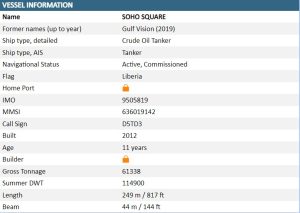
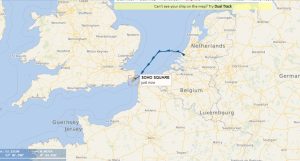
To update the tracking point scan QR-CODE

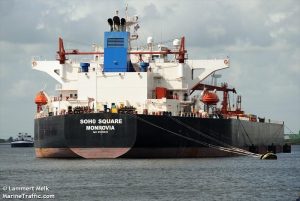
GDG Supply Capability Report
Golden Diamond Group is fully prepared to supply the product (EN590 S10PPM), which has the exclusive capability to produce diesel fuel for the world’s leading refineries. The sales capacity of the product depends on the selection procedure of the esteemed customer and their position within the layers of the main buyer company, buyer, intermediary company, and broker company. We have implemented different policies at each level to cater to the needs and satisfaction of our clients. In order to ensure a secure business transaction and purchase, we always advise our customers to consider the following:
1) Enhance your advertising efforts in this market and stay updated with relevant industry knowledge.
2) Seek the assistance of honest and experienced oil professionals as consultants.
3) Initiate the purchase process with a small trial spot.
4) Avoid engaging in broker behavior that could potentially damage your brand’s reputation.
5) Develop professional negotiation and meeting skills.
6) Fulfill all the necessary requirements for each delivery procedure based on standard protocols.
7) Undergo a legal examination of the buyer’s financial capacity through banking mechanisms after negotiations have commenced.
8) Provide intermediaries and brokers with commission commitment documents upon contract conclusion.
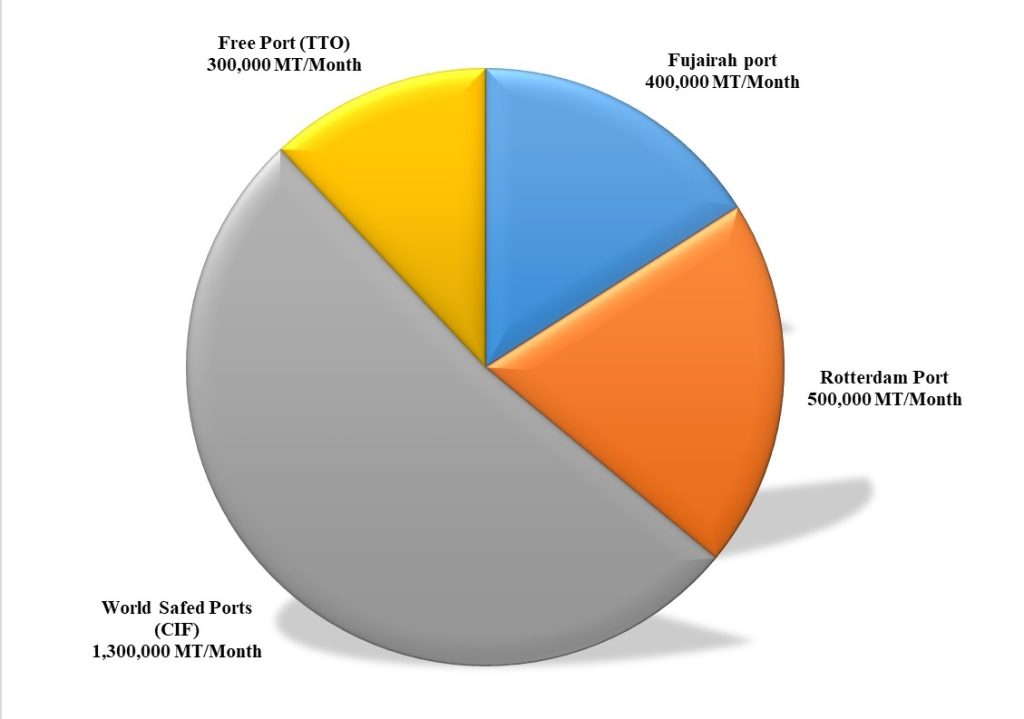
World Tank Farms

Largest Tank Farm
(in the world)
Tank farms, also known as oil storage terminals or oil depots, are facilities used to store large quantities of petroleum products, such as crude oil, gasoline, diesel, and jet fuel. These tank farms play a crucial role in the global oil supply chain.
There are numerous tank farms around the world that are engaged in storing diesel fuel. Some of the most prominent ones include:
• Vopak Terminal Eemshaven (Netherlands)
• Royal Vopak Europoort (Netherlands)
• Neste Oil’s Porvoo Refinery (Finland)
• PBF Energy’s Delaware City Refinery (United States)
• Phillips 66’s Bayway Refinery (United States)
• Marathon Petroleum’s Garyville Refinery (United States)
• Valero Energy’s Benicia Refinery (United States)
• Tesoro Corporation’s Anacortes Refinery (United States)
• BP’s Cherry Point Refinery (United States)
• ExxonMobil’s Baton Rouge Refinery (United States)
While it is difficult to provide an exact ranking of the top 10 tank farms in the world due to the constantly changing nature of the industry and the lack of publicly available data, here are some of the largest and most well-known tank farms globally:
-
Ras Tanura Terminal (Saudi Arabia) : Located on the Persian Gulf, Ras Tanura Terminal is one of the largest oil terminals in the world. It has a capacity of over 33 million barrels and is a key export point for Saudi Arabia’s oil production.
-
Port of Singapore (Singapore) : The Port of Singapore is one of the busiest and largest oil trading hubs in the world. It has numerous tank farms and terminals with significant storage capacity.
-
Houston Ship Channel (United States) : The Houston Ship Channel in Texas is home to several tank farms and refineries. It serves as a major hub for oil and gas storage and transportation in the United States.
-
Rotterdam (Netherlands) : Rotterdam is Europe’s largest port and an important oil storage and trading center. It has various tank farms and terminals with substantial storage capacity.
-
Fujairah Oil Terminal (United Arab Emirates) : Located in the UAE, Fujairah Oil Terminal is a major oil storage and trading hub in the Middle East. It has a significant storage capacity and serves as a strategic location for global oil trade.
-
Cushing (United States): Cushing, Oklahoma, is a key hub for crude oil storage in the United States. It serves as a major delivery point for oil futures contracts and has significant tank farm facilities.
-
Ulsan (South Korea) : Ulsan, located on the southeastern coast of South Korea, is home to several large tank farms and oil terminals. It serves as a crucial energy hub in East Asia.
-
Yanbu Industrial City (Saudi Arabia) : Yanbu Industrial City in Saudi Arabia houses several tank farms and refineries. It plays a vital role in the country’s oil production and export.
-
Primorsk (Russia) : Primorsk is a major oil terminal located on the Baltic Sea in Russia. It has significant storage capacity and plays a crucial role in Russia’s oil export operations.
-
Corpus Christi (United States) : Corpus Christi

GDG Logistics and Energy Deputy is ready to serve its customers for advice on renting storage tanks in tank farms around the world.
DIESEL FUEL QUALITY
Quality Factors of Diesel Fuel Production
The quality of diesel fuel EN590 depends on several factors, including:
- Sulfur content :
EN590 specifies a maximum sulfur content of 10 parts per million (ppm) for the fuel. Lower sulfur content results in lower emissions of sulfur dioxide and particulate matter. - Cetane number :
EN590 requires a minimum cetane number of 51. A higher cetane number indicates better ignition quality and improved engine performance. - Density :
EN590 specifies a density range of 820 to 845 kg/m3 at 15°C. Density affects the energy content of the fuel and its ability to flow through pipelines. - Distillation characteristics :
EN590 specifies distillation characteristics, such as the temperature at which 10% and 90% of the fuel has evaporated. These characteristics affect the cold flow properties of the fuel. - Stability :
EN590 requires the fuel to be stable under normal storage conditions. Fuel stability affects its ability to resist degradation and the formation of deposits in fuel storage tanks and engines. - Lubricity :
EN590 requires the fuel to have a minimum lubricity value. Lubricity affects the ability of the fuel to lubricate engine components and prevent wear and damage.

Analyze Specification
| PARAMETER | UNITS | LIMITS | TEST METHOD |
| Aspect Color | Clear 2.0 | ASTM D1500 | |
| Cetane Number | no | 51.0 min | EN ISO 5165:1998 |
| Cetane Index | index | 48.0 min | EN ISO 4264:1996 |
| Density at 15oC | Kg/m3 | 820 min to 845 max | EN ISO 3675 EN ISO 12185:96 C1:2001 |
| PolicyclicAromatic Hydrocarb | %(m/m) | 8.0(5) max | EN 12916:2001 |
| Sulfur Content | mg/kg | 10.0 max | EN ISO 20884:2004 |
| Flash Point | OC | 55(1) | EN ISO 2719:2002 |
| Carbon Residue (on 10% Dist. Residue) | %(weight) | 0.15 max | EN ISO 10370:1995 |
| Ash Content | mgKOH/g | 0.03 max | EN ISO 6245:2002 |
| Water Content | mg/kg | 200 max | EN ISO 12937:2000 ASRM D 2709 |
| Total Contamination | mg/kg | 15 max | EN 12662: 2002 ASRM D 2709 |
| Copper Strip Corrosion (3 Hours at 50OC) | mg/kg | Class 1 | EN ISO 2160:1998 |
| Oxidation Stability | g/m3 | 20 min | EN ISO 12205:1996 |
| Lubricity, WSD at 60OC | M3 | 460 max | EN ISO 12156-1:2000 |
| Viscosity at 40OC | mm2/sec | 2.00 min to 4.50 max | EN ISO 3104:1996 |
| Distillation Vol. Recovered at: 150OC 250OC 350oC 95% Point | % (V/V) % (V/V) % (V/V) OC | 2,0 max 65,0(2) max 85,0(2) min 360,0 max | EN ISO 3405:2000 |
| Fatty Acid Methyl Esters (FAME) Content | % (V/V) | 5 max | EN 14078 |
| Total Acidity | mgKOH/g | 0,3 max | ASTM D 974 |
| Electrical Conductivity(4) | Ps/m | 50 min | ASTM 2624; ISO 6297 |
| Biodiesel Content(5) | 0 | EN 14078:2003 | |
| C.F.P.P (Summer) (3) | OC | 0 | EN 116:1997 ASTM 6371 IP 300 |
| C.F.P.P (Winter) (3) | OC | -10 | EN 116:1997 ASTM 6371 IP 300 |
| Cloud Point (Summer) | OC | Report | EN 23015:1994 ASTM 2400 ASTM 2771 |
| Cloud Point (Winter) | OC | 0 | EN 23015:1994 ASTM 2400 ASTM 2771 |
WORLD DIESEL FUEL REFINERIES
ASIA | Top 10 Refineries
here are some of the refineries that produce diesel fuel EN590:
- Reliance Industries Ltd., India
- Bharat Petroleum Corporation Ltd., India
- Hindustan Petroleum Corporation Ltd., India
- Mangalore Refinery and Petrochemicals Ltd., India
- Petron Corporation, Philippines
- Pertamina, Indonesia
- Binh Son Refining and Petrochemical Company, Vietnam
- Thai Oil Public Company Limited, Thailand
- Formosa Petrochemical Corporation, Taiwan
- SK Energy, South Korea
South America | Top Refineries
here are some of the refineries that produce diesel fuel EN590:
- Petrobras, Brazil
- YPF, Argentina
- Ecopetrol, Colombia
- ENAP, Chile
- Petroperú, Peru
North America | Top Refineries
here are some of the refineries that produce diesel fuel EN590:
- ExxonMobil, USA
- Valero Energy, USA
- Marathon Petroleum, USA
- Phillips 66, USA
- Imperial Oil, Canada
- Suncor Energy, Canada
Rusia & CIS Countries | Top Refineries
here are some of the refineries that produce diesel fuel EN590:
- Gazprom Neft, Russia
- Rosneft, Russia
- Lukoil, Russia
- Tatneft, Russia
- Surgutneftegas, Russia
- Bashneft, Russia
- KazMunayGas, Kazakhstan
- Turkmenbashi Complex of Oil Refineries, Turkmenistan
- Baku Oil Refinery, Azerbaijan
Middle East | Top Refineries
here are some of the refineries that produce diesel fuel EN590:
- Saudi Aramco, Saudi Arabia
- Abu Dhabi National Oil Company (ADNOC), United Arab Emirates
- Kuwait National Petroleum Company (KNPC), Kuwait
- Bahrain Petroleum Company (Bapco), Bahrain
- Qatar Petroleum, Qatar
- National Iranian Oil Company (NIOC), Iran
EUROP | Top Refineries
here are some of the refineries that produce diesel fuel EN590:
- Total, France
- BP, United Kingdom
- Shell, Netherlands
- Eni, Italy
- ExxonMobil, Belgium
- Repsol, Spain
- OMV, Austria
- PKN Orlen, Poland
- Neste, Finland
- Galp Energia, Portugal
Africa | Top Refineries
here are some of the refineries in Asia that produce diesel fuel EN590:
- Sonatrach, Algeria
- Egyptian General Petroleum Corporation (EGPC), Egypt
- National Oil Corporation of Kenya (NOCK), Kenya
- Société Ivoirienne de Raffinage (SIR), Ivory Coast
- Société Nationale de Raffinage (SONARA), Cameroon
- Société Africaine de Raffinage (SAR), Senegal
